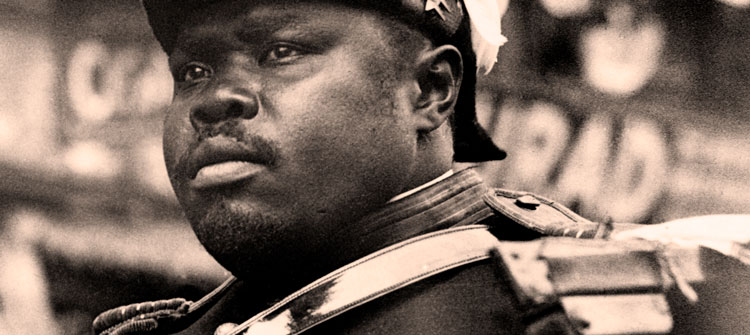June 18, 1923: Marcus Garvey convicted of mail fraud

Photo of Marcus Garvey by George Rinhart/Contributor/Getty Images
In October 1919, a young Justice Department staffer wrote a memo describing the activities of Marcus Garvey, a rising star in the politics of the nation’s black community. The perfunctory, executive-length memo described Garvey’s efforts to finance the Black Star Line, a black-owned shipping company. What concerned the writer, a young J. Edgar Hoover, was not so much the shipping company but rather Garvey’s association with “radical elements.”
Hoover’s memo followed the “Red Summer” of 1919, when a spate of anarchist bombs—including one at the home of U.S. Attorney General A. Mitchell Palmer—short-circuited any domestic tolerance for radical politics. In the absence of specific links to the bombings, the government sought to harness immigration laws to expel prominent foreign-born radicals from the country.
The memo lamented that Garvey had broken no federal laws to warrant deportation. “It occurs to me, however, from the attached clipping that there might be some proceeding against him for fraud in connection with his Black Star Line propaganda.” And to that end, Hoover hired the FBI’s first black agents, who over the next three years were tasked with investigating and infiltrating Garvey’s emerging organization.
Jamaican-born Marcus Mosiah Garvey Jr. was certainly a radical—but one of his own peculiar brand. Neither anarchist nor Bolshevik, Garvey was drawn to Booker T. Washington’s self-reliance philosophy, which he sought to merge with Pan-Africanism and the “Back to Africa” movement. Widely read, charismatic and intellectually boundless,
Garvey began attracting followers—and money—to his organization, the Universal Negro Improvement Association. As a prolific writer and electric public speaker, Garvey created a network of publications, lectured widely on black self-reliance and flirted throughout his career with white racists who supported his separatist philosophy. At the apogee of Garvey’s influence, in the early 1920s, the UNIA claimed 4 million followers.
At the time of Hoover’s memo, Garvey was appealing a New York state conviction for criminal libel. The charge grew from Garvey’s published rebuttals to accusations that the Black Star Line—the UNIA’s signature enterprise—was a fraud. Incorporated in June 1919, the Black Star Line was conceived as a hemispheric connection for black citizens. Its stock was sold at UNIA meetings and conventions for $5 per share. And whether or not it was the fraud Hoover perceived, it was a mismanaged mess.
The SS Yarmouth, a refurbished coal carrier and the line’s first ship, was in service to Caribbean ports within five months, but its schedules and routes were erratic and its cargoes uninsured. Bearing an unattended leak, the SS Shadyside sank in the Hudson River off New York City’s 157th Street. A boiler eruption on the SS Kanawha killed a man.
But it was advertising for the SS Phyllis Wheatley—named for the Colonial-era poet Phillis Wheatley—that caught Hoover’s attention. A photo of the Wheatley proved to be of the Orion, a ship the Black Star Line had tried—but failed—to purchase. And when Garvey and three others were subsequently indicted for mail fraud, Garvey critics such as W.E.B. Du Bois proved unsympathetic.
As Garvey awaited trial, Du Bois attacked him. In his widely read periodical The Crisis, he granted faint praise for Garvey’s ambition to “unite Negrodom” through the shipping venture. It was, he said, “a brilliant suggestion and Garvey’s only original contribution to the race problem.” He then proceeded to dismantle Garvey’s stewardship, using court records, published investor complaints and Garvey’s own shifting accounts.
At trial, Garvey decided to act as his own attorney. Garvey was rightly indignant at the obvious government conspiracy, but by the trial’s end on June 18, 1923, his incompetent self-counsel and characteristic bombast left him the only defendant convicted among the four tried for fraud.
Garvey was sentenced to five years. After a failed appeal, he entered federal prison in Atlanta, serving 33 months before his sentence was commuted by Calvin Coolidge. He was released and deported to Jamaica.
Before he died in London in 1940, Garvey spent the rest of his life lecturing across the globe. He sought, but never received, a presidential pardon.



